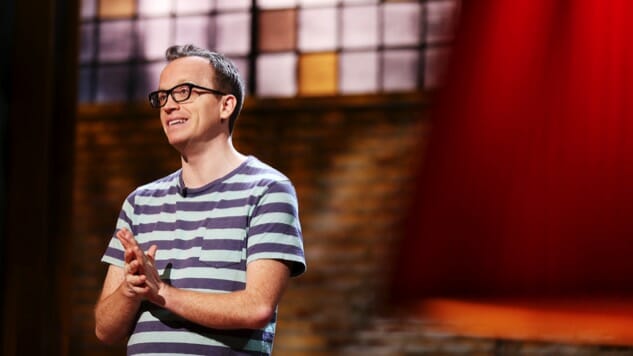In His Superb Career Suicide, Heaven Knows Chris Gethard’s Miserable Now
Photo by Craig Blankenhorn/HBO
Full disclosure about anxiety, depression and suicidal ideation have always been important to Chris Gethard and the cult fanbase he’s developed through regular performances at the Upright Citizen’s Brigade Theatre and his anti-talk show, The Chris Gethard Show. Gethard has always taken seriously his responsibility towards the fans who write him about their own struggles and who see themselves—I once saw him stop a performance with Mike Birbiglia’s Dream to deliver a rousing monologue to an audience volunteer who had just told a story about her estranged father (an incident partially documented in Don’t Think Twice). This latest installment in Judd Apatow’s gradual takeover of HBO, and his attempt to give an entire generation of comedians a leg-up, takes this seriously as well. It’s no coincidence or punk-rock flourish that the audience is seated in couches and comfy chairs.
Not that Gethard needs a leg-anything. Career Suicide, which premieres Saturday night, comes on the heels of the announcement that The Chris Gethard Show will continue on truTV, switching back to its live format. That makes this entire year—from his standout role in Don’t Think Twice to Career Suicide’s Off-Broadway run to this HBO special—both a victory lap and a well-earned mainstream splash for a quintessentially fringe entertainer.
And he couldn’t have arrived at a better time. With 13 Reasons Why out there saying kids could totally kill themselves if they’re looking to get back at people, I’m very glad that there’s a show providing an honest, compelling warts-and-all look at these topics from a first person perspective, one that acknowledges and embraces the three-steps-back-one-step-forward reality of living with depression. It also thoroughly calls bullshit on the myth that depression fuels creativity, a romantic ideal that is as boring as it is dangerous. “I would love it if, in December, Kurt Cobain dropped a Starbucks-exclusive Christmas album,” Gethard says, wishing that artists lost to suicide were at least alive to churn out shitty music. In fact, he rejects the idea that he has any kind of depression origin story. His thesis? “Sometimes people just break. Welcome to a comedy show!”
At this point in the Marc Maron/Louis C.K. era of oversharing onstage, let’s not pretend that there’s anything unattractive or taboo about admitting your neuroses and anxieties and darkest parts of your personality. But you can still do so dishonestly, and as it becomes more and more in vogue for comedians to get candid and dark, the more and more likely it will be that comics will use that as a shortcut to authenticity. Gethard does not do that. I would venture that with enough misinformation about depression and suicide out in the ether, being forthcoming about these experiences is actually very important in its own right. So yes, this show is significant and important for a whole hatful of reasons. But is it funny? Obviously. Gethard is a master storyteller, and this special elaborates on the essays from his book A Bad Idea I’m About to Do with a jittery, off-the-cuff charm. Out loud, his stories spill out in a barrage of words and qualifications before hitting a detail that neither Gethard nor we, the audience, were expecting.
-

-

-

-

-

-

-

-

-

-

-

-

-

-

-

-

-

-

-

-

-

-

-

-

-

-

-

-

-

-

-

-

-

-

-

-

-

-

-

-








































